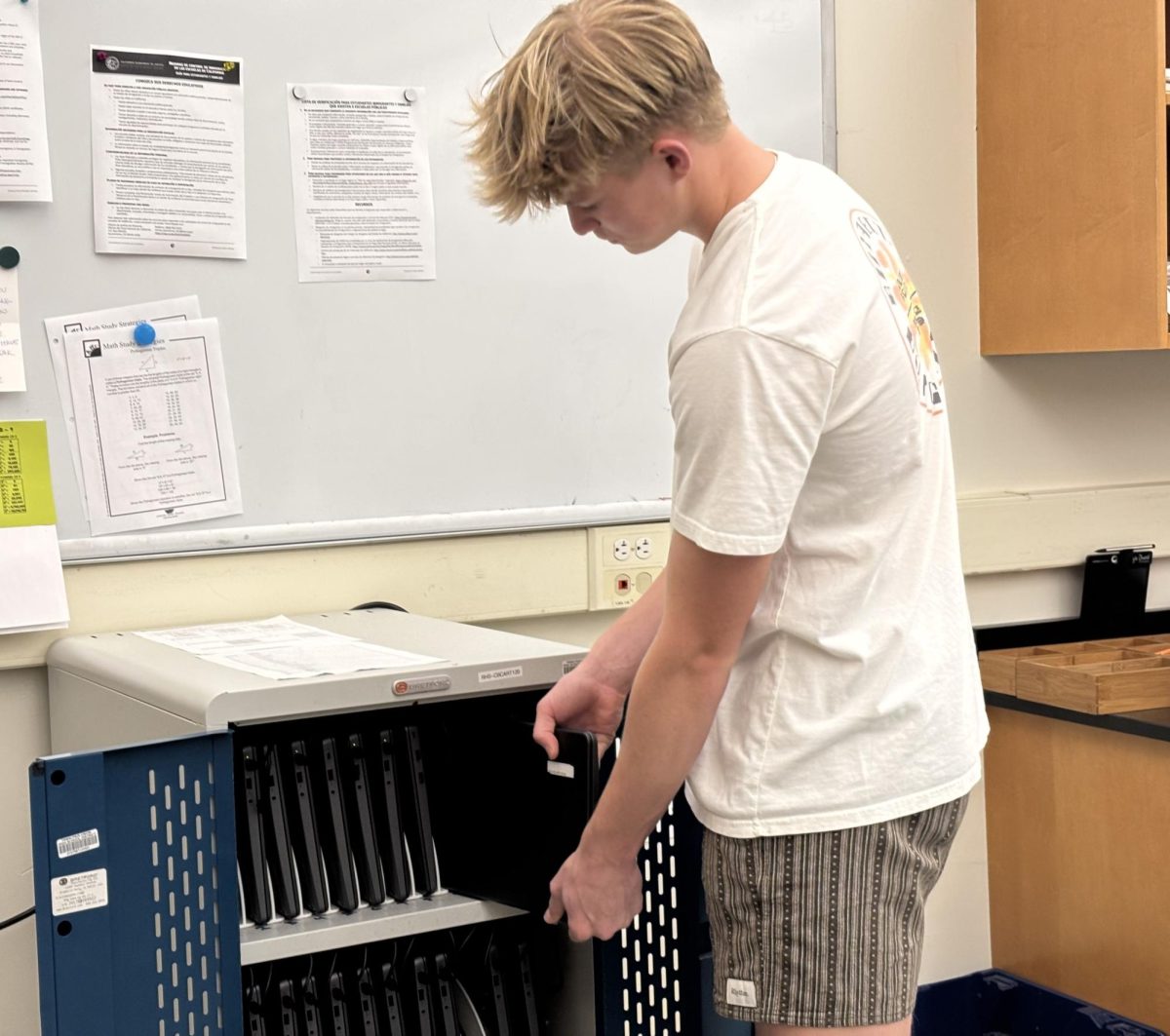Drake’s student-run newspaper, the Jolly Roger, has been unable to publish in print this semester after the print shop run by the Tamalpais Union High School District (TUHSD) was shut down.
The cease in printing is due to a provision in the district Classified Staff Union, a chapter of the California Schools Employee Association’s (CSEA) contract which states that if a position held by a classified staff member is eliminated, that position can not be outsourced for 39 months. Because the position of the classified staff member, Ali Hekmat, who ran the District print shop, was eliminated, this provision was enacted and has prevented the Jolly Roger from outsourcing to an outside printer.
CSEA chapter president Tim Mullery believes that the TUHSD decided to cut the print shop due to budgetary issues. According to TUHSD superintendent David Yoshihara, the print shop was closed because of a move away from printed materials.
“The usage of print shop services has been declining for many years due to the shift to other media,” Yoshihara said in an email interview. “Print shop services has been a contribution program during that time. Based partially on another study around print shop services, staff recommended its closure to the Board towards the end of the 2016-17 fiscal year.”

In order to redistribute the work done by the print shop, which includes printing flyers and instructional material in addition to printing the Jolly Roger, the CSEA must negotiate with the TUHSD board to come to a solution that can be agreed upon by both parties, according to Mullery. However, after not being able to come to an agreement, the CSEA officially declared on impasse with the TUHSD on Feb. 15. A state mediator will work with both parties to come to an agreement starting March 27.
While negotiations continue, the district has no plans to allow the Jolly Roger to use an outside printer.
“In the immediate, we plan to allow the Jolly Roger to exist online and other methods that don’t involve printing,” Yoshihara said.
According to Mike Hiestand, a legal consultant for the Student Press Law Center (SPLC), the enactment of the provision is a violation of the students’ rights to free press.
“The students never agreed to this and the school district certainly doesn’t have the right to contract away its students’ legal rights,” Hiestand said. “The students have the right to put out a newspaper. If it means that they need to go someplace else, they have every right to do that. You can’t stop somebody from exercising their First Amendment or even state law rights in California because of a contract.”
Additionally, Hiestand believes that the responsibility falls upon the district and the CSEA to resolve the issue, rather than the students.
“The grown-ups need to get their acts together,” he said. “They need to realize that it’s simply outrageous that these parties would think that penalizing students by taking away their newspaper for three years is going to fly. It won’t.”
Mary Jane Jones, the Jolly Roger’s adviser, also believes that the district needs to take action.
“I think the district should have done some clever thinking before. Because look, they are [negatively] affecting kids. And that’s not their job,” Jones said.
Aaron Silverstein, an editor-in-chief of the Jolly Roger, said that he has talked to a member of the CSEA, and thinks that they are willing to work toward a solution.
“[Kris Knusten, member of the CSEA negotiating team] told me [the intention of the classified staff] is not to try to get in the way of the students, and they see that this is, and they’re going to work on a resolution. I just wish it would be sooner rather than later and diplomatic stuff usually takes longer,” Silverstein said.
According to Mullery, the CSEA made it clear to the TUHSD board that repercussions could occur should the print shop be eliminated and that it was willing to come to a reasonable compromise that benefits both parties.
He also said that the CSEA feels bad that the elimination of the print shop is affecting the students negatively, but does not feel as if it is their fault.
In fact, according to Mullery, the CSEA presented a “logical” solution to the board, but feels as if the district had no interest in the solution.
As the impasse and mediation process continues, the district hopes to continue to move forward to come to an agreement.
“CSEA has declared impasse on this matter. If we partake in the impasse process, we hope that we can come to a resolution that is acceptable to both parties,” Yoshihara said.
Silverstein said that this delay is disheartening and resulted in a loss of motivation among some members of the Jolly Roger staff.
“It’s tough when they have the excuse of ‘Oh, we’re not even going to print this issue.’ I’m doing my best to keep everyone motivated and keep everyone on task and I’ve been very impressed as of recent with how they’ve kind of kept at it,” Silverstein said.
The Jolly Roger plans to move forward producing content and to print all their issues at once when the issue gets resolved, according to Jones.
Yet, even if they are permitted to move to an outside contractor, Silverstein fears that they may not have adequate funding to do so.
“The other problem we’re going to run into is we budgeted out so that we could pay the district printer this whole time, who charges us less,” Silverstein said. “Going to an outside printer is going to charge significantly more and the truth is we probably don’t have that money.”
Moving forward, the Jolly Roger hopes to come to an agreement with the union that does not invalidate the provision, but rather makes an exception for this specific case, according to Silverstein.
“It’s a tough spot for us because we want to print. For me that’s the best feeling when I can actually hold the paper,” Silverstein said. “But I don’t want to get in a fight with teachers because I totally agree with the clause.”
Mullery, on the other hand, hopes to be able to come to a long-term solution to the problem rather than a one-time exception, but said he can’t speak to exactly what that would be.
However, should the CSEA not come to an understanding with the Jolly Roger, Hiestand recommends publicizing the issue to put pressure on the union to come to an agreement.
“[The Jolly Roger staff] need[s] to make a big stink and just say ‘This is not okay. This is not acceptable,” Hiestand said. “[The district] need[s] to figure out how you’re going to fix this and if you don’t, we’re going to take legal action.’”
Jones also believes that publicizing the issue will lead to change.
“I have a feeling that with some attention put on this issue, they’re going to resolve this fairly quickly because it makes them look bad,” Jones said. “The district office doesn’t look like it knows what it’s doing.”
A lawsuit, should the situation escalate to that point, would be costly and embarrassing for the district, and would be a case the district would lose, according to Hiestand.
“Lawsuits cost the school a lot of money. [The SPLC] is going to try to help find [The Jolly Roger] free attorneys that are willing to take this case on because what’s happening isn’t right and needs to be fixed. But I guarantee the school district attorneys aren’t going to take it on for free, and that’s going to cost the school a lot of money,” Hiestand said.
For updated coverage on this issue, click here.





